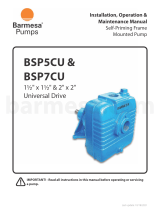
Operating Instructions and Parts Manual
Self-Priming Engine-Driven
Centrifugal Pumps
4
Installation (continued)
2. Mount the unit on a solid founda-
tion. On fixed installation, install
both a union and a gate valve (not
furnished) on the discharge side of
the pump for service convenience.
Do not use a globe
or other restricting
type of valve at the discharge, as this
would seriously restrict the capacity of
the pump.
3. Attach suction line piping to the suc-
tion inlet and discharge line piping
to the discharge outlet. The suction
line should be positioned such that
there is a continual upward slope
from the fluid source to the pump.
Avoid using loops or sections of pipe
or fittings which might permit air to
become trapped.
IMPORTANT: If plastic or fabric hose is
used for the suction piping, it should
be of a reinforced type so as not to col-
lapse under suction. The discharge pip-
ing should be at least the same size as
the discharge connection. Suction pip-
ing should be the same size as the dis-
charge piping or one size larger. Unless
long horizontal runs are involved, dis-
charge piping should not be larger
than suction piping. Avoid using
looped sections of pipe which might
permit air to become entrapped. Assure
air-tight pipe connections with the use
of a pipe joint sealant.
4. A foot-valve may be used on the
suction line to assist in faster pump-
ing. The foot-valve should be
installed when the suction lift is over
10 feet or when the suction line is
over 10 feet long.
5. A suitable suction strainer should be
attached to the suction line so that
large pieces of foreign material are
not drawn into the pump. The maxi-
mum opening in the suction strainer
should not be greater than 25% of
the suction inlet size for solid han-
dling pumps and 50% of the suction
inlet size for trash pumps.
Operation
1. Fill the engine crankcase with oil as
specified in the engine manual. If the
engine has no dipstick, then fill the
crankcase with oil until the oil over-
flows (starts spilling out of the
crankcase). Periodically check oil level
thereafter.
2. Fill the gasoline tank as required.
Refer to engine instruction booklet.
Never add gasoline
to a hot engine!
See General Safety Information for
proper handling of gasoline.
3. Fill the pump with liquid through the
pump discharge or the priming port
supplied with these units. It may be
convenient to screw in a service tee
or a tee with a nipple into the dis-
charge, so that the pump can be
filled (using the upper leg of the tee)
without disconnecting the discharge
hose or pipe. The vertical leg must be
closed with a pipe plug during
pumping. Remember, the pump is
self-priming only when the pump
casing has been filled. The pump
should prime and re-prime without
refilling. Refilling is necessary occa-
sionally if an unusual siphoning has
occurred, if the fluid has been lost by
evaporation, and when the unit is
moved to a new location.
Do not run pump
dry, as permanent
damage to the mechanical seal will
result.
4. Start the engine, following instruc-
tions in the engine manual.
5. With a suction lift of 5 to 10 feet, the
pump should discharge liquid within
020598 and 020599
Document2 9/3/03 5:48 PM Page 4
















